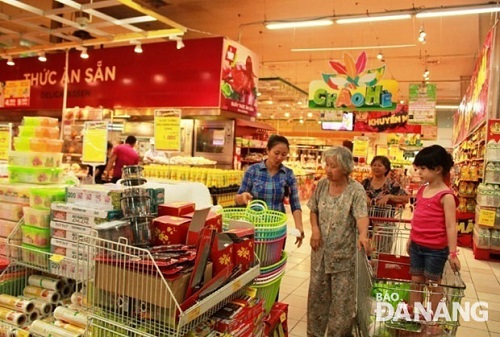TPP agreement expected to bring challenges to retailers
Since early November, Viet Nam has allowed foreign retailers to establish wholly foreign-owned retail companies in the country under the commitment it made to enter into the World Trade Organisation (WTO). In addition, the Trans-Pacific Partnership (TPP) agreement on tariff exemptions between its 12 member nations has been recently signed. These are both expected to bring many challenges to Vietnamese businesses, including both distributors and retailers.
In attempting to help local distributors and retailers to boost their international integration, the Da Nang Department of Industry and Trade has recently organised numerous workshops and training courses to provide them with basic information about the international trade agreements.
 |
| Shoppers at a local supermarket |
The Department’s Deputy Director, Mrs Nguyen Thi Thuy Mai, said that before TPP was signed, Da Nang had emerged as an attractive destination for many of the world’s leading retailers such as Metro, BigC, Lotte Mart and Parkson. She predicted that the city is likely to see an increasing number of foreign retailers in the years ahead, which will result in fierce competition between local businesses and their foreign rivals.
The Director of the Intimex Da Nang company, Mrs Phan Nhu Yen, highlighted some challenges faced by domestic retailers during their international integration. In particular, foreign retailers are transnational corporations with strong financial potential, and they possess modern retail channels. By contrast, Vietnamese retailers often operate independently and face a shortage of capital.
Mr Ho Quoc Nguyen, Head of the External Affairs and Public Relations Office of the BigC Viet Nam company, affirmed that Da Nang has great potential for the retail industry due to the high purchasing power of local residents and those from neighbouring localities and the millions of foreign and domestic visitors arriving in the city every year.
In order to further the development of local retailers, a focus is on developing infrastructure for trading activities, as well as ensuring a harmonious combination between traditional and modern trade. Special attention is being paid to taking advantage of being an economic hub in the central region in order to perfect the city’s wholesale and retail distribution networks. Many effective measures will be taken to help local businesses with a focus on assisting them to improve the professional skills of their employees and promote their trade activities.